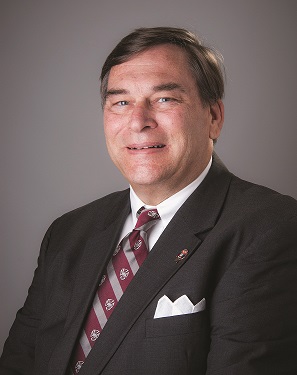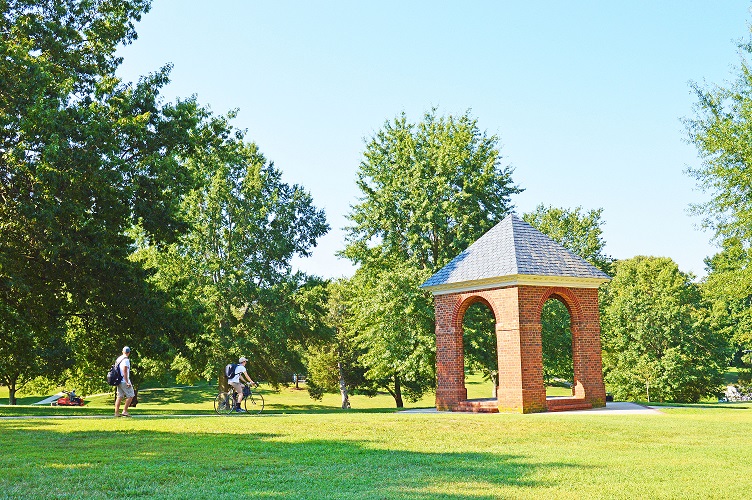
Randy Reed is director of planned giving at Hampden-Sydney College and an alumnus of the school. Located in central Virginia, Hampden-Sydney was founded in 1775, making it the tenth oldest college in the United States.
Give & Take: What are some things that make Hampden-Sydney unique?
Reed: Besides being one of the three all-male colleges still in existence in the U.S., Hampden-Sydney is known for several things—most notably our friendliness and our honor code. One of our “unofficial” taglines is: We are not a small college, but a large family. There is a sense of warmth and community here. When you walk across campus, people greet one another by name.
Another important thing that defines Hampden-Sydney is our honor code, which states, “I will not lie, cheat or steal, nor tolerate those who do.” The honor code is student-run and student-enforced. It is sacred and dear to everyone: students, faculty and alumni.
Give & Take: How did you come to be director of planned giving at Hampden-Sydney?
Reed: After I graduated from Hampden-Sydney in 1982, I went to work for Circuit City and held various management positions. In 2005, I returned to Hampden-Sydney as a member of the development team, first as a major gifts officer and then in 2014 I became director of planned giving.

Give & Take: What are some similarities between working in the for-profit world and fundraising?
Reed: Having spent the bulk of my career managing people, I’ve learned fundraising is very similar. To be a good manager, you should engage your employees and listen, so you can help them do their jobs better. It is essential to communicate, help them set goals and understand who they are. Last, you must acknowledge their accomplishments.
Asking someone for a gift is about identifying what their philanthropic goals are and then helping them reach them. You must ask questions and, most importantly, LISTEN. A “no” from a donor may really be a “not right now,” or a “I’d like to make that gift, but…” What I love about planned giving is that in the latter instance I am often able to help donors make gifts they didn’t think they could make.
Give & Take: Tell me about a gift like that that comes to mind.
Reed: I have a donor who is an alumnus and board member. Our board members were asked by the chairman of the board to consider making a planned gift. This donor is on the younger side, so he was not really a candidate for some of the typical planned gifts.
When I met with him, I asked if he would be interested in making a gift of life insurance, naming Hampden-Sydney as owner of the policy and beneficiary. I explained that his premium payments would be eligible for a tax deduction. He was thrilled when he realized he will eventually be making a seven-figure gift to the college. He also liked that the policy would build cash value for the benefit of the college over time. As a result, he has become even more engaged than he was before.
Give & Take: What is one of the most valuable lessons you’ve learned as a fundraiser?
Reed: It’s actually some simple advice I received before I began my career in fundraising, but it has been critical for me. It’s the importance and impact of the hand-written note.
Years ago, I heard a speech from a congressman explaining how his office prioritizes responses to their constituents. An email from a constituent received low priority. A typed letter received middle priority. A handwritten letter received top priority. That advice has always stayed with me. In my own career, handwritten notes I have sent to donors and those considering larger gifts have led to wonderful gifts that have made a huge impact on Hampden-Sydney.
Give & Take: Are you seeing any trends or recent changes in planned giving?
Reed: I’m seeing a greater awareness of the importance of planned giving—not just in higher education. We are definitely putting more focus on it at Hampden-Sydney by hosting a yearly event for our 230-member 1776 Legacy Society, sending targeted communications via mail and electronic communications to prospective planned gift donors and including planned giving ads in The Record, our alumni magazine.
We are also working with Sharpe Group on a highly customized leave-behind piece about various ways of giving to Hampden-Sydney, and we will send a newsletter this fall that will feature a donor story and information on year-end giving.
Give & Take: What advice would you give to someone starting out in planned giving?
Reed: My advice would be twofold: First, you should always follow through with what you say you are going to do. This builds trust with the donor, which is essential.
The second piece of advice, which I mentioned earlier, is to listen. The best way to succeed in this type of fundraising is to ask open-ended questions and let the donor talk. I believe if you do this job right, you will complete more gifts by listening for them rather than leading off with asking. ■

